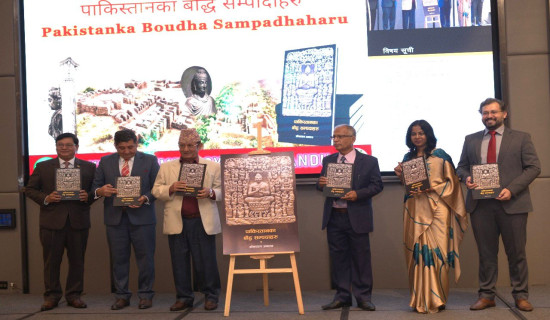- Thursday, 10 July 2025
War, The Paradox For Humanity
Anish Ghimire
The word "war" originated from the German word Werran, which means to confuse or to cause confusion. The first recorded war happened in 2700 BCE between Sumer and Elam. Years on, war has become a reality that cannot be unseen. It is actively happening in parts of the world. Usually occurring in armed conflict, war has been active in shaping the course of the world. The world today is the consequence of generations and generations of war.
Professor Miguel A. Centeno of Princeton University presents a paradox of war – in which he says that war is always viewed as a source of human devastation and pain, but seldom as a strategic and organized way of executing a mission. That is how we choose to see war.
War is much more than that, says the professor. It is both the most chaotic scene humanity has seen and a thing of great planning and strategy. War is both. And that is the paradox of war.
Human Casualty
Something impossible to be unsighted of is the casualty of human lives – for the general public seems to always shoulder the bill of war. Many families become displaced, many go missing, and for many their lives are shaken and destroyed. But these are considered the ugly side of war. The brighter, much-focused part is pride and triumph.
A feeling of patriotism emerges from war. Many young men decide to join the military because they want their country to never bow to other countries. The young blood is enthusiastic to defend the sovereignty of the country. And thus it is said that the military is the religion of honorable men.’ In modern times, military strength is taken as a vital component of a nation. It can be directly linked to the outlook of a country.
Some wars are born from the fatigue of tolerating injustice, cruelty, and oppression. Revolutions around the world have changed the lives of people. Many revolutions take the face of war. War is opted, at times, as a way to end all the other wars. The war against unjust leadership, the war against a regime that oppresses its citizens, and so on. Throughout history, many revolutionary wars have taken place which has given people the freedom they enjoy today. And Nepal is no exception. We take pride in our military. We take pride in the Gorkhali Army, whose tales of bravery echo around the world. We beam with pride when we recall the ferocity shown by our troops against the British Army.
So, is war all about losses of life, or is war a way of being liberated? Is war a source of pain or a source of triumph? War is a reality and we have to take it the way it is. The Maoist insurgency was an ugly war but it was born in desperation for change. The country was dismantled at the time as people were involved in bloodshed. But many consider it a pivotal moment in Nepalese history as it brought about a change and a sense of freedom. People who lost their lives during that period didn’t really lose their lives but they sacrificed their lives for a change. In war, sacrifice is a virtue and cowardice is a vice.
Similarly, the people of India celebrate Independence Day on August 15th as it marks the day when India was liberated from British rule. Such independence wasn’t handed to them. There was a struggle, there was a war even though the latter one was a non-violent one. In The Indian Mutiny (1857 - 1859) which was a rebellion against the rule of the British East India Company – more than one hundred thousand Indians had to sacrifice their lives, which resulted in the dissolution of the East India Company. But later the nation came under the direct rule of the monarchy which was known as the British Raj.
But war is not all that. Some wars aren’t waged because of intolerance. Other wars occur because of a feeling of arrogance, miscalculation, greed, honour, and other emotional factors. Many generals and leaders around the world have waged war because their emotions got the better of them. While waging war, common sense is barely used and wagers act merely on emotions to destroy. Such wars are often the ugliest ones.
Conflicts today are launched mostly for geopolitical motives. Political wars aren’t a new thing, as the Prussian military analyst Carl Von Clausewitz says, "war is a continuation of politics by other means." The general public shoulders the bill, regardless of the nature of the war. It is true for Nepal, India, and every other civilization in the world.
War Is Business !
Also, there are people/organisations called war profiteers who generate wealth from war. In the book called, “How they rule the world” the writer Pedro Baños (colonel of the Spanish army) writes that 21,000 new millionaires and billionaires were made in the US during World War. War is business, says Baños, in which profits are reckoned with in dollars and losses in lives.
So, a gripping question lies as to what is the true identity of war. For some, a roadmap for independence, and for others, is a source of pain and despair. Wars have given people untold misery and trouble.
(Ghimire is a student at Tribhuwan University.)
















